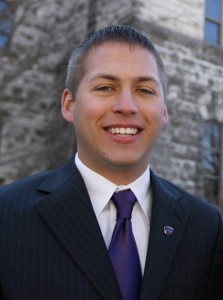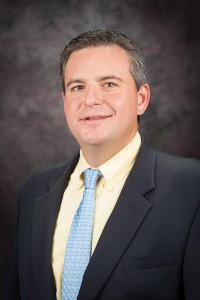Kansas State Agricultural Economics Faculty receives $2.5 million with five projects
Funding from the U.S. Department of Agriculture’s (USDA) National Institute of Food and Agriculture (NIFA) is expected to assist communities and regions in creating self-sustaining, long-term economic development through research and strategic planning.
Nearly $14 million in grants was awarded. Three agricultural economists at Kansas State University and a fourth at Purdue University who will join the K-State department later this year, received more than $2.5 million of those grant dollars to promote rural community development, economic growth and sustainability.
“These awards will allow our department to conduct research that can impact and improve the lives of rural Kansans,” said Allen Featherstone, professor and head of the K-State Department of Agricultural Economics. “The research areas of water management, voting and buying behavior, international trade and global climate variability, and value-based supply chain production on farms have various impacts to our Kansas farmers and rural citizens. We want this research to impact their livelihood and rural communities in a way that makes them sustainable and continuously moving forward.”
The projects for Kansas State, each totaling around $500,000, include:
Aquifer depletion and water management
 The project director for this grant is Chatura B. Ariyaratne, research assistant professor. He will study how the reduced availability of irrigation water and rising pumping costs due to groundwater depletion make management decisions more critical for the sustainability of agriculture.
The project director for this grant is Chatura B. Ariyaratne, research assistant professor. He will study how the reduced availability of irrigation water and rising pumping costs due to groundwater depletion make management decisions more critical for the sustainability of agriculture.
“The economies of large regions such as the Great Plains are dependent on groundwater availability, making aquifer depletion a much-discussed policy and research issue,” Ariyaratne said. “Greater volatility in crop and energy prices has added more uncertainty to farmers’ cropping and irrigation decisions.”
This project focuses on the role of changing prices, technology, and climate on aquifer depletion, and the performance and impacts of different water management policies in the face of these uncertain trends.
Other co-project directors from K-State’s agricultural economics department include Jeffery Peterson, Nicolas Quintana Ashwell, Nathan Hendricks, Brian Briggeman and Bill Golden. Bridget Guerrero is a collaborator on the project.
Voting and buying behavior
 According to Glynn Tonsor, agricultural economist with K-State Research and Extension and project director for this award, the U.S. public increasingly sends mixed signals in their voting and buying behaviors resulting in ‘unfunded mandates’ that significantly add complexity to society’s challenges of feeding a growing population.
According to Glynn Tonsor, agricultural economist with K-State Research and Extension and project director for this award, the U.S. public increasingly sends mixed signals in their voting and buying behaviors resulting in ‘unfunded mandates’ that significantly add complexity to society’s challenges of feeding a growing population.
“The consumers’ mixed signals are providing a knowledge gap among our industry leaders and decision-makers,” Tonsor said. “This limits informed decision-making when it comes to key decisions in the agricultural industry that make a difference in how we are feeding our growing population.”
The long-term goal of this project is to substantially increase understanding of the existence, drivers, and implications of differences in voting behavior and consumer food buying behavior.
Co-project directors for this award are Kathleen Brooks and Bailey Norwood.
Understanding and forecasting changes in consumer demand for disaggregated meat products
According to Glynn Tonsor, co-project director for this award, there is an increasing need to better understand changing consumer preferences for meat products. To date, most consumer research either uses very aggregated, nationally representative data or involves surveys at a single point in time that convey a “snap shot.” This research will further develop and build upon existing consumer tracking surveys.
Tonsor will work with collaborators at Oklahoma State University to assess how stable consumer preferences are when assessed in regular nationwide monthly surveys and compared to other more commonly available data and information sets. This research ultimately will provide more accurate and timelier information on key issues regarding consumer food preference and lead to better decisions among producers and policy makers.
Jayson Lusk is the project director for this award.
The role of international trade in adapting U.S. agriculture to increased global climate variability
 Nelson B. Villoria, an agricultural economist at Purdue University who will join the K-State faculty later this year, was awarded monies to study how more frequent extreme weather events are expected to increase the volatility of U.S. crop yields and the income stability of agricultural sectors.
Nelson B. Villoria, an agricultural economist at Purdue University who will join the K-State faculty later this year, was awarded monies to study how more frequent extreme weather events are expected to increase the volatility of U.S. crop yields and the income stability of agricultural sectors.
“Global trade is an important source for stabilizing markets. Our study hypothesizes that climate shocks simultaneously affecting the U.S. and other global regions during a given marketing year reduce the ability of the trade system to mitigate shortages resulting in sudden sharp price changes,” he said. “Our study seeks to understand how stockholding and international trade can help adapt U.S. agriculture to a changing climate, particularly to disruptions associated with increased variability.”
Co-project directors for this award are from Purdue University. They include Thomas Hertel, Dev Niyogi, Paul Preckel and Hao Zhang.
Impacts of values-based supply chains on farms

Hikaru Hanawa Peterson, project director of this grant and K-State agricultural economics professor, will study the impacts of values-based supply chains (VBSCs) on small- to medium-sized farms.
“These supply chain alliances are distinguished by two sets of values: one based on product attributes and the other based on shared ethics among participants in the chain,” Peterson said. “While there is a growing understanding of the organizational dimensions of VBSCs, very little has been documented to date about their extent or characteristics and the actual impacts for farmers.”
Researchers will work to better understand, evaluate, and improve the performance of VBSCs as profitable outlets for diverse, small and medium-sized farms. “The project outcomes include new opportunities for farms and VBSCs to build farm profitability, expand access to healthy foods for communities, and contribute to the development of more environmentally sustainable and equitable regional agrifood systems,” Peterson said.
Co-project directors for this grant include Gail Feenstra, Marcy Ostrom and Keiko Tanaka.
NIFA made the awards through the Agriculture and Food Research Initiative’s (AFRI) Foundational Program, which supports projects that sustain and enhance agricultural and related activities in rural areas and to protect the environment, enhance quality of life, and alleviate poverty. For more information, visit www.nifa.usda.gov.
A fact sheet with a complete list of awardees and project descriptions is available on the USDA website.
Story by | Elaine Edwards, K-State Research and Extension | elainee@ksu.edu








